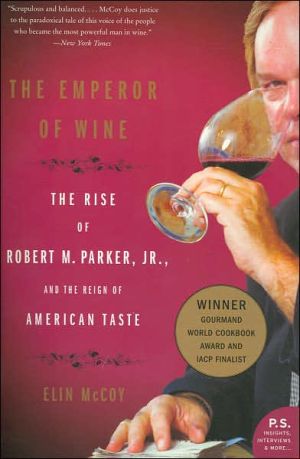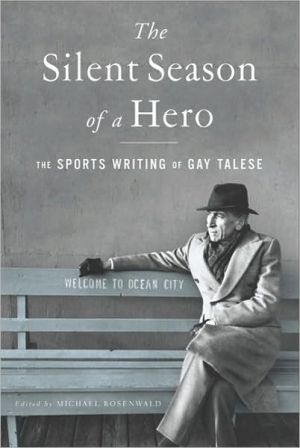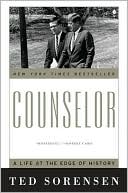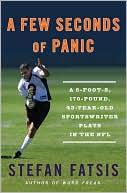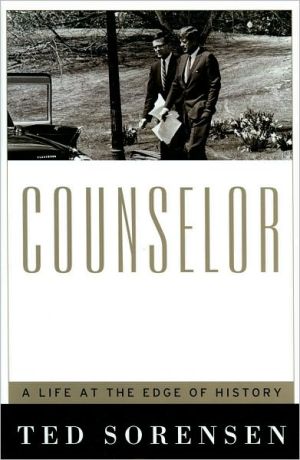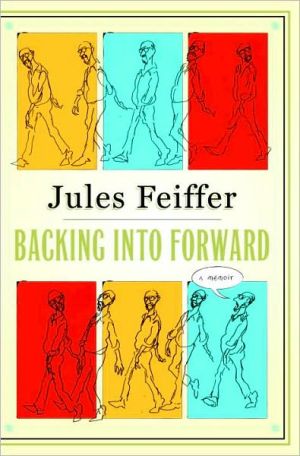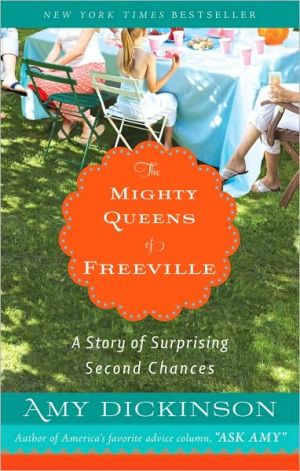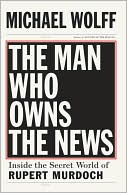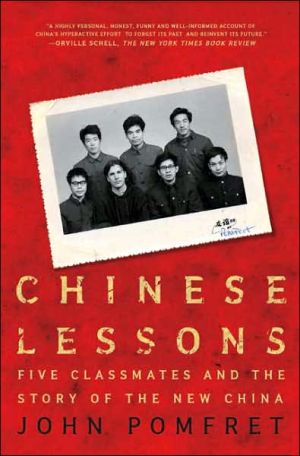Emperor of Wine: The Rise of Robert M. Parker, Jr. and the Reign of American Taste
This is the story of how an American lawyer raised on Coca-Cola caused a revolution in the way wines around the globe are made, sold, and talked about.\ The world's most influential wine critic, Robert M. Parker, Jr., has dominated the international wine community for the last quarter century, embodying the triumph of American taste. Using Parker's story as a springboard, author Elin McCoy offers an authoritative and unparalleled insider's view of the eccentric personalities, bitter feuds,...
Search in google:
Journalist McCoy writes regularly about wine and spirits for Bloomberg Markets and Food and Wine. Parker is a wine taster, and the most powerful wine critic in the world, who can make a winery with a smile or break one with a wince. She investigates how an American raised on soft drinks, who never tasted fine wine before college, became such a colossus. Her focus in on the times and circumstances. Annotation ©2004 Book News, Inc., Portland, OR The New York Times - Tony Hendra The best part of her book is a lively history of the wine world of the 70's, in which it becomes clear that the reforms in European wine production for which Parker takes credit were under way well before his arrival, for example in the person of the French oenologist Emile Peynaud. The complacency of the French had been shattered years earlier in a storied 1976 blind tasting in Paris of Californian wines, whose quality stunned the French wine press. As for the English wine press, the old fustian school had been swept away a decade before that by a new irreverent generation, now mature, who are far more diligent in vinous research than Parker and far more entertaining; for example, Oz Clarke, Anthony Hanson and, above all, Jancis Robinson.
The Emperor of Wine\ The Rise of Robert M. Parker, Jr. and the Reign of American Taste \ \ By Elin McCoy \ HarperCollins Publishers, Inc.\ Copyright © 2005 Elin McCoy\ All right reserved.\ ISBN: 0060093684 \ \ \ Chapter One\ An American Palate In Formation\ Onkton, Maryland, population 4,615, seems an unlikely hometown for the world's most important wine critic. When Robert McDowell Parker, Jr., was born in Baltimore on July 23, 1947, the landscape north of the city around Monkton was much as it is now -- a typical rural American mix of working dairy farms, white clapboard farmhouses and modest brick ranch houses, and patches of second-growth woods and rolling fields. As I drove to his house to spend a day with him, though, a few large, white-fenced horse farms alerted me to the presence of the affluent elite of huntcountry blue bloods who have long presided over point-to-point horse races each spring and fall and attended the annual Blessing of the Hounds at the local Episcopal church.\ But Parker didn't grow up on one of those grand estates, where the occasional bottle of wine may have graced the table evei back in the 1940s and 1950s. His parents married at eighteen and never went to college. For the first few years of his life, home was the family dairy farm in Monkton, only a 10-minute drive from where he lives today. Some of the first smells to hit his now famous nose were fresh milk, cows in the barn, and hay warm from the sun.\ Three hundred years ago, when barrels of Bordeaux wines like Château Haut-Brion and Château Margaux were being regularly auctioned off in London, Monkton and all of northern Baltimore County was still the domain of the Susquehannock and Piscataway Indian tribes. In 1634 it was granted to the king's representative, Charles Calvert, the third Lord Baltimore, who founded Maryland and leased thousands of acres to settlers before giving a choice parcel that included Monkton to his fourth wife. Besides dairy farming and creameries, grist- and sawmills were the earliest industries here, now long gone; the old stone mills survived as antique shops and homes. Back in the 1950s, when Parker was growing up, Monkton and neighboring Parkton (where he now lives) were mere clusters of houses and churches; Monkton had only a tiny food market, no library or dry cleaner, and the nearest drugstore was 15 miles away.\ Today the town is bigger, encompassing all-American nondescript shopping plazas with supermarkets as their centerpieces; a main street with the standard town businesses-banks, pizzerias, auto repair shops. and garden centers; and a bland brick high school set in a field with a sign that reads Hereford High School, Home of the Bulls. This wasn't a fine wine and food place in the 1950s, and it still isn't, despite the growing number of "executive-style" development homes and the presence of two tiny wineries a few miles away. The distance to Baltimore is only 27 miles but must have seemed farther before Interstate 83 was built, linking the city to points north.\ Forget the wide range of gourmet staples urban Americans take for granted. The store nearest Parker's house in Parkton turned out to be just a country place with an old-fashioned Drink Coca-Cola sign and out front, a barrel of cabbage flowers edged with American flags. The local give-away paper has ads for popular wines he ignores, like Beringer White Zinfandel, and lists of tree farms where you can cut your own for Christmas. The score of the latest Hereford Bulls basketball game is the big news.\ Parker's childhood was a typical one in small-town America of the 1950s, which meant that food was plentiful but unimportant. His mom's kitchen repertoire was unsophisticated farm cooking of the meat loaf and fried chicken variety, but apart from her wonderful banana cream and lemon meringue pies, Parker remembers having no particular opinion about what appeared on the family table. Wine was never served; the beverages of choice were milk, soda, or coffee, and the occasional cocktail. As a teenager Parker wasn't the least interested when his father, Robert Sr., who drank Bourbon and loved inhaling its rich scent, held out a glass and suggested, "Oh, you should smell this?" And when Robert Sr., an enthusiastic hunter who kept bluetick hounds, told Robert Jr. on a hunting trip that you could tell the breed of a dog by its smell, the boy thought he was joking. Only much later in life did he realize that his father had an unusually acute sense of smell, and that he had inherited this same ability.\ It was a happy childhood steeped in the middle-class normalcy of riding bikes, roughhousing with the family cocker spaniels, playing soccer, hanging out with friends, and enjoying the security of a stay-at-home mom, Ruth "Siddy" Parker, who never left her only child with a baby-sitter and didn't work outside the home until he was in college. When he was four his father gave up the dairy farm, the family moved a few miles to a newly built ranch house, and Robert "Buddy" Parker, Sr., went to work selling construction site equipment for a Baltimore-based oil company, eventually becoming a vice president. He traveled extensively for his job, but Bob Jr. didn't go much farther than Baltimore, Washington, D.C., and once by train to New York City. This cluster of towns in northern Baltimore County, now known as the Hereford zone, was his world.\ A soccer star in high school -- he twice made the all-county team as goalie -- Parker was popular, handsome, and easygoing, with the boundless energy that would one day carry him through marathon wine tastings and 12- to 14-hour days visiting vineyards. His intensity, competitive spirit, and fierce determination emerged on the athletic field, where, his mother once observed, "he'd kill himself to win." During one faculty-student soccer game, he was carried off the field and rushed to the hospital with caved-in ribs and bruised lungs after a teacher butted him in the chest ...\ \ Continues... \ \ \ \ Excerpted from The Emperor of Wine by Elin McCoy Copyright © 2005 by Elin McCoy. Excerpted by permission.\ All rights reserved. No part of this excerpt may be reproduced or reprinted without permission in writing from the publisher.\ Excerpts are provided by Dial-A-Book Inc. solely for the personal use of visitors to this web site. \ \
\ Gerald Asher"A riveting morality tale for our time."\ \ \ \ \ Los Angeles Times"…highly anticipated…The thoroughness of McCoy’s reporting is impressive…prodigious."\ \ \ USA Today"Emperor of Wine is a vibrant absorbing portrait..."\ \ \ \ \ New York Times Book Review"A lively history"\ \ \ \ \ BusinessWeek"A fascinating analysis of Parker’s substantial influence..."\ \ \ \ \ New York Times"Scupulous and balanced...no wine book will receive more attention."\ \ \ \ \ Decanter Magazine"...an extraordinay exploration of the Parker phenomenon...impeccably researched…"\ \ \ \ \ New York Times“Scupulous and balanced...no wine book will receive more attention.”\ \ \ \ \ Los Angeles Times“…highly anticipated…The thoroughness of McCoy’s reporting is impressive…prodigious.”\ \ \ \ \ USA Today“Emperor of Wine is a vibrant absorbing portrait...”\ \ \ \ \ New York Times Book Review“A lively history”\ \ \ \ \ BusinessWeek“A fascinating analysis of Parker’s substantial influence...”\ \ \ \ \ Decanter Magazine“...an extraordinay exploration of the Parker phenomenon...impeccably researched…”\ \ \ \ \ Tony HendraThe best part of her book is a lively history of the wine world of the 70's, in which it becomes clear that the reforms in European wine production for which Parker takes credit were under way well before his arrival, for example in the person of the French oenologist Emile Peynaud. The complacency of the French had been shattered years earlier in a storied 1976 blind tasting in Paris of Californian wines, whose quality stunned the French wine press. As for the English wine press, the old fustian school had been swept away a decade before that by a new irreverent generation, now mature, who are far more diligent in vinous research than Parker and far more entertaining; for example, Oz Clarke, Anthony Hanson and, above all, Jancis Robinson.\ — The New York Times\ \ \ \ \ Publishers WeeklyAnyone who's been swayed by the point system when buying wine-selecting a "93" over an "86," for example-can blame Robert Parker, founder of the newsletter the Wine Advocate and now considered by many to be the most influential wine critic ever. McCoy, a wine writer for Bloomberg and Food & Wine, points out that Parker can ruin a winery simply by stamping a sub-80 label on its product. In this amalgamation of biography and American wine mini-history, McCoy delves into how Parker became such a towering figure. Parker discovered fine wine on a European trip during college; his growing obsession with the grape prompted him to start the publication that would later change the way wine was rated, bought and consumed. Between snippets of Parker's life, McCoy tries to set the scene for his rise by explaining how wine consumption boomed in the U.S. in the 1970s. The background is useful, but it and other distracting forays into social history sometimes make the work feel disjointed. Another failing is McCoy's sometimes hagiographic depiction of Parker. But these quibbles knock this otherwise engrossing book down by only a few points on the taste scale. Agent, Alan Kaufman. (July) Copyright 2005 Reed Business Information.\ \ \ \ \ Library JournalMuch as excellent food and superb wine complement each other, so do McCoy's writing skills (see her work in Food & Wine magazine) and Robert M. Parker's remarkable career as a wine critic. Cast as a biography, this book provides an excellent historical description of how and when wine became big business in Napa, Burgundy, and Bordeaux and the role that Parker played in the process. Many baby boomers will identify with Parker's development as a wine enthusiast: he was not born into a privileged household where fine foods and wine were appreciated; instead, blessed with keen senses of taste and smell, he developed his palate for wine as a young man touring Europe. After years as a student and a lawyer preoccupied with wine, Parker was able to launch a career as a wine writer. While writing about Parker's development, McCoy also chronicles the growth and development of other key personalities, vintages, vineyards, and wineries. The book will not only be a walk down memory lane for veteran wine enthusiasts, but it will also be a great source for young oenophiles eager to learn the recent history of wine in the United States and France. Highly recommended. (Index and illustrations not seen.)-Ann Weber, Bellarmine Coll. Preparatory Lib., San Jose, CA Copyright 2005 Reed Business Information.\ \ \ \ \ Kirkus ReviewsHow the wine industry came to cater to a very particular Nosy Parker. Who has not favored a bottle of wine because of its numerical score? Chances are, wine and spirits writer McCoy reminds us, that the grade was set by Parker, Le Pape du Vin, reputed to be gifted with the best nose in the business. A wine critic autodidact, Parker started his life in oenology at home in a Washington, D.C., suburb with the mimeographed Wine Advocate, a break from his day job as a corporate attorney. Soon his sharp advocacy spread beyond the beltway. He hired a printer, quit practicing law, added a tasting room to his home and sampled 10,000 wines each year. As the affluent boomer lads of Wall Street became hooked, Parker matured as autocrat of fermented juices. He authored bestselling texts on varietals. Naturally, as his influence increased, he faced critics and competitors, lawsuits and even death threats. As Parker grew stout, vintners learned to produce the kind of drink he liked. Robust French reds designed to secure his 90 nod filled the barrels, as well as the spit receptacles at ubiquitous blind tastings. The producers grumbled, but they liked the francs the Americans provided. Parker, now entitled to wear the rosette of the Legion of Honor, remains the recognized grandee of wine criticism, offering, he insists, truth in beverage. Some see him as the bully of the vineyard. McCoy knows Parker and she knows the tetchy wine business as well. She's familiar with the arcane, often fey language and the nasty hostilities of oenology. She is, finally, ambivalent about Parker's certitude and influence. To some readers, it may seem a lot about a little hedonism; maybe a whiff of the otiose with the oak. Butfor wine enthusiasts and grape groupies, her text offers something quite juicy. A straightforward bio of Le Grand Bob, and a glimpse into the world of cool cellars and fretful sellers.\ \
